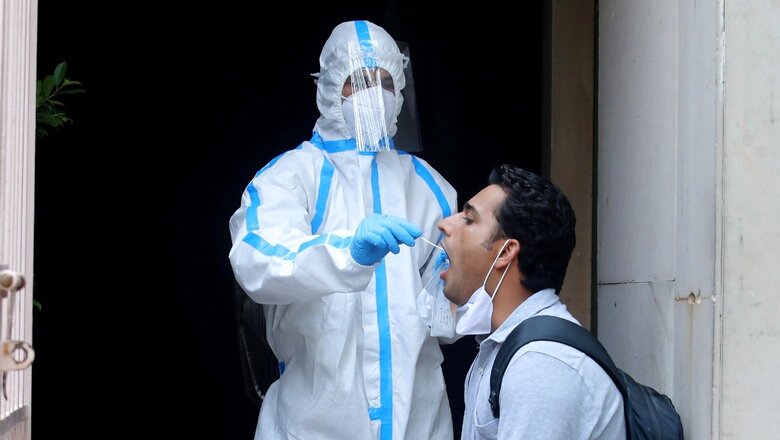
views
A doctor from the United Kingdom has highlighted a “telltale” symptom of an Omicron infection that occurs only at night. Last week, Dr Amir Khan of the UK’s National Health Service, said this nightly symptom could mean that a person has contracted the Omicron variant of the novel coronavirus.
The latest variant is driving up Covid-19 cases by leaps and bounds across the world, and is known to be three times more transmissible that the highly infectious Delta variant. While scientists are still trying to understand the new variant, a combination of Omicron and Delta variants is being blamed for an explosion of cases in the US and Europe. ‘Delmicron’, the twin spikes of Delta and Omicron, has the ability to transmit even faster.
The Omicron variant, though highly mutated and showing resistance to Covid vaccines, is still causing less severe symptoms as compared to previous variants. Dr Khan told UK newspaper The Sun that apart from the commonly known symptoms caused by the new variant, night sweats was a new one that could lead towards an Omicron infection.
The Sun quoted Dr Khan as calling it a “telltale” sign and “those kind of drenching night sweats where you might have to get up and change your clothes”.
Known Covid-19 symptoms are a dry, continuous cough along with high fever as well as a loss of taste or smell. But data coming out of South Africa, where Omicron was first detected, shows that the variant may be causing other symptoms, including scratchy throat, mild muscle pain, fatigue and dry cough. More data shows that lower back pain could be another symptom.
Omicron patients experienced severe headache, body pain, tiredness and mild fever unlike common flu-like symptoms of Covid-19, said Dr Angelique Coetzee, a physician who first flagged the highly mutated strain in South Africa.
She also said patients did not have cough, runny nose, high fever or sore throat – the classic symptoms of Covid-19. But the main complaints were severe headache, body pain, exhaustion, mild temperature and slightly scratchy throat.
OMICRON LESS SEVERE, THREE STUDIES GIVE HOPE
A South African study along with two British studies have shown that Omicron may not be as severe as previous strains such as Delta, which wreaked havoc and caused large-scale hospitalisations as well as deaths.
In India, too, the Delta surge in May led to a massive loss of lives. Not only that, many patients continue to suffer from debilitating post-Covid symptoms while others suffered from major diseases such as mucormycosis.
The South African study has shown that the Omicron variant appears to be having a less severe impact than earlier variants.
“In South Africa, Omicron is behaving in a way that is less severe,” said Cheryl Cohen, professor in epidemiology at the University of the Witwatersrand, who shared results of a research titled ‘Early assessment of the severity of the Omicron variant in South Africa’ on Wednesday in an online briefing by National Institute for Communicable Diseases (NICD).
“Likely this is generalisable to other countries in the region in sub-Saharan Africa, which have similar very high levels of previous infections,” Cohen said, adding that the picture might not be similar in countries where there are high levels of vaccination with very low levels of previous infections.
The two new British studies, meanwhile, also provide some early hints that the Omicron variant may be milder than the Delta version. Scientists stress that even if the findings of these early studies hold up, any reductions in severity need to be weighed against the fact Omicron spreads much faster than Delta and is more able to evade vaccines. Sheer numbers of infections could still overwhelm hospitals.
An analysis from the Imperial College London Covid-19 response team estimated hospitalisation risks for Omicron cases in England, finding people infected with the variant are around 20 per cent less likely to go to the hospital at all than those infected with the Delta variant, and 40 per cent less likely to be hospitalised for a night or more.
A separate study out of Scotland, by scientists at University of Edinburgh and other experts, suggested the risk of hospitalisation was two-thirds less with Omicron than Delta. But that study pointed out that the nearly 24,000 Omicron cases in Scotland were predominantly among younger adults aged 20 to 39. Younger people are much less likely to develop severe cases of Covid-19.
(With agency inputs)
Read all the Latest India News here













Comments
0 comment